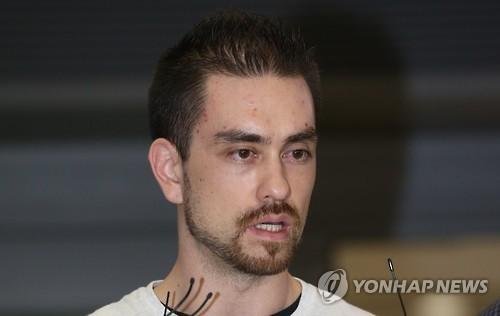The key suspect in a reopened murder case denied his charges of stabbing a South Korean college student to death in Itaewon, Seoul, nearly two decades ago at the first court hearing on Thursday.
Arthur John Patterson, a 35-year-old U.S. citizen, was extradited to Korea late last month to face a new trial on charges of murdering Cho Joong-pil, 22, in 1997 at a Burger King restaurant in Itaewon, a multicultural district frequented by expats residing in Seoul.
 |
Arthur Patterson (Yonhap) |
At the hearing, Patterson accused Korean-American Edward Lee of killing Cho, who was found on the restroom floor with several wounds to his neck. Cho died in transit to a hospital.
On Thursday morning, Patterson looked pale and nervous in the green prison uniform as he walked into the court room with more than 100 in attendance.
“Patterson said he could not admit to the charge as Edward Lee stabbed the victim,” Oh Byung-joo, Patterson’s lawyer, said on his behalf in the courtroom.
“The crime was committed without a motive or purpose, which could only have been done by a person who was either crazy or under the influence of drugs,” Oh said, citing Lee’s record of drug abuse and dealing.
Lee, now 36, was also at the crime scene and sentenced to 20-year jail term in an appeals court for murdering Cho. But Lee was later cleared of the murder for lack of evidence in the retrial ordered by the highest court.
In what many see as botched investigation, Patterson was indicted on lesser charges including destruction of evidence and possession of an illegal weapon at the time.
A year later, prosecutors launched a new probe into the murder case, viewing Patterson as the prime suspect. But Patterson fled to the U.S. after the government failed to renew his travel ban.
This time, the prosecution vowed to revisit evidence and collect more testimonies to prove Patterson’s guilt in the fresh trial.
Given the location of the stabbing, the prosecution initially ruled out the possibility that Patterson, who is shorter than the victim, stabbed Cho. But newfound evidence, the victim’s backpack, allegedly indicated otherwise.
The prosecution also said it had already secured testimonies from Patterson and Lee’s friends who witnessed them leaving the crime scene.
But Patterson’s lawyer questioned the credibility of the evidence provided by the prosecution, including the backpack and Patterson’s bloodstained T-shirt, asking the judges to closely look into them.
Patterson’s lawyer also took issue with Korea’s double jeopardy rule banning a defendant to stand trial over the same charge for a second time, even if new evidence comes to light.
Patterson was already convicted of destroying evidence and carrying a weapon and served his jail term until he was freed in special amnesty in 1999.
But the prosecution refuted his claims, saying that Patterson was indicted on a murder charge this time.
Another sticking point is whether the statute of limitations on murder could apply to Patterson.
If Patterson were found to have intentionally fled to the U.S. in 1999 to avoid being punished here, his statute of limitations could be extended, making it possible for the prosecution to further investigate the case.
By Ock Hyun-ju (
laeticia.ock@heraldcorp.com)








![[Today’s K-pop] Blackpink’s Jennie, Lisa invited to Coachella as solo acts](http://res.heraldm.com/phpwas/restmb_idxmake.php?idx=644&simg=/content/image/2024/11/21/20241121050099_0.jpg)